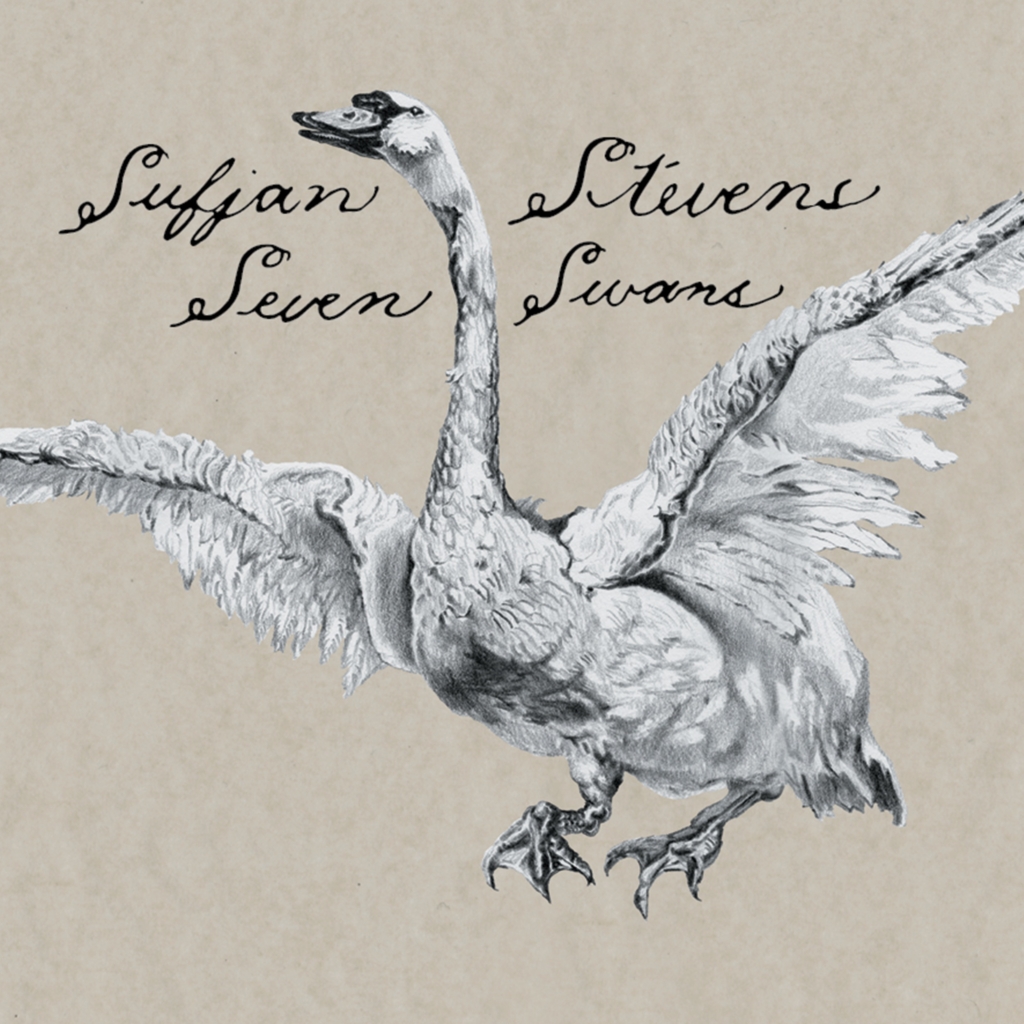Sufjan Stevens
Seven Swans (Deluxe Edition) (Asthmatic Kitty)
Contact Jessica Linker, Jacob Daneman, Yuri Kwon about Sufjan Stevens
The folk songs of Sufjan Stevens’ Seven Swans occupy a singular space in the singer-songwriter’s prolific catalog. To celebrate the album’s 20th anniversary, Asthmatic Kitty Records announces Seven Swans (Deluxe Edition), an expanded version of the original album with special physical editions, out June 21st and available for preorder now. In this new anniversary edition, the LP is accompanied by a flexi-disc featuring the album’s original b-sides “I Went Dancing With My Sister” and “Waste of What Your Kids Won’t Have,” which also appear on the digital version for the first time. The reissued album will be available in a variety of physical formats, including a zoetrope picture disc edition as well as on silver and split-colored vinyl.
For Stevens, Seven Swans has remained a work in constant motion, something to revisit and reinvent at each stage in his evolution. With an atmosphere that feels equally cozy and cosmic, the album is carried by the refined pluck of Stevens’ banjo and acoustic guitar, the confessional tug of his voice, the tension of his melodies, and the profound questions of devotion and doubt that drive his songwriting to this day.
A definitive moment in Stevens’ body of work, the quiet, psalm-like music of Seven Swans arrived less than a year after his 2003 breakthrough album, Michigan and his much-publicized announcement to write an album for each of the 50 states. Wider audiences were becoming acquainted with the ever-evolving artist—who had, by this point, released a lo-fi folk-pop collage (2000’s A Sun Came), a Zodiac-inspired electronic suite (2001’s Enjoy Your Rabbit), and a grand, orchestral epic to kickstart his exploration of the country (Michigan)—when Sufjan re-introduced himself in the hushed tones of this album.
First released by Sounds Familyre in March 2004, Seven Swans marked a rare instance of Stevens ceding control as a producer. Working with Daniel Smith, the leader of the folk collective Danielson Famile, Stevens tracked these songs in Clarksboro, New Jersey, utilizing Smith’s home studio and recording space in the New Jerusalem Rec Room. When Smith chose to accompany Stevens, he accentuated the songs with ghostly choral backing vocals, crisp brush-stroked drums, the playful chime of a keyboard, and, in the closing moments of the record, a triumphant fanfare that teased the melodic motif from Stevens’ imminent 2005 classic “Chicago.”
In this way, Seven Swans draws a direct line from Stevens’ home-recorded early work to the biggest stages he had ever played, blending his pop instincts with his penchant for fragile, open-ended character studies. The lyrics veer between the intimate—a best friend’s wedding, a bedside in the early morning—and the expansive: the mountain where Abraham was called to sacrifice his son, a sky filled with apocalyptic visions. On Seven Swans, the writing is intuitive and swift, never settling quite long enough to reveal the full picture: a quality that’s made these songs an enduring source of scholarly conversation among his devoted fanbase.
Stevens himself has frequently reinterpreted this material over the years. If you caught his 2006 tour with the “Illinoisemakers” band, you may have seen him emerge on stage with wings affixed to his back, leading his accompanists through an electric, Crazy Horse-style overture that comprises more than half the runtime of “Sister.” On the technicolor live shows behind 2011’s noise-pop overhaul The Age of Adz, Stevens opened his sets with Seven Swans’ bracing title track, embellishing its operatic arc with newfound drama and theatrics.
Despite cultivating a vast influence that spans genres, Seven Swans is defined by its sense of intimacy. Think of it as Stevens’ self-penned book of prayer, a talisman that’s never been far from reach. This was a time in his career when his songwriting dealt explicitly with themes of Christianity, and his stark performances helped bring the celestial down to earth. Staples of his songbook like “The Dress Looks Nice on You” and “To Be Alone With You” are disarming in their gentleness, and for every gesture toward a divine presence, Stevens knew how to balance it with a vulnerable expression of humanity, using the language of love songs to outline the shadow of uncertainty in devoting ourselves to something bigger. Listening to Seven Swans leaves us with enough hope, mystery, and wisdom to make it feel alive and exalting whenever we return.

